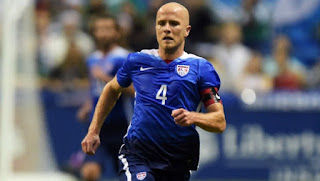Here's what I was wrong about in my last post:
1. The U.S. will inevitably lose to Germany.
The Yanks have a chance if they play as well, and play mostly the same players, as they did against China (sorry Kelley O'Hara, you were good, but you're the odd woman out as way has to be made for Megan Rapinoe). Not saying we'll win. Just no longer saying we're sure to lose.
The Yanks have a chance if they play as well, and play mostly the same players, as they did against China (sorry Kelley O'Hara, you were good, but you're the odd woman out as way has to be made for Megan Rapinoe). Not saying we'll win. Just no longer saying we're sure to lose.
2. Amy Rodriguez (her energy and defending from the front were exactly what the U.S. needed).
3. Assuming Canada had what it took to get past England.
Here's what I was right about in my last post:
1. Lauren Holiday.
2. Abby Wambach.
3. Carli Lloyd.
 |
| (photo from usatoday.com) |
4. Germany (barely).
5. Japan.
6. Canada.
Things I meant to say and didn't:
1. In case you haven't noticed, the U.S. defense is really, really good. Can you win a World Cup with a great defense and a so-so offense? Undoubtedly. Since the first half against Australia, Hope Solo hasn't had to do much of anything in goal. That's how good Ali Krieger, Meghan Klingenberg (my personal favorite among the defenders), Julie Johnston, and Becky Sauerbrunn have been.
Things I meant to say and didn't:
1. In case you haven't noticed, the U.S. defense is really, really good. Can you win a World Cup with a great defense and a so-so offense? Undoubtedly. Since the first half against Australia, Hope Solo hasn't had to do much of anything in goal. That's how good Ali Krieger, Meghan Klingenberg (my personal favorite among the defenders), Julie Johnston, and Becky Sauerbrunn have been.
Yet to be determined:
1. Whether Jill Ellis has the guts to sit Wambach and Holiday against Germany. Remember my comment about how Michael Bradley is more at-ease in an attacking role when he knows Kyle Beckerman has his back? Same for Lloyd and Morgan Brian, who has improved by leaps-and-bounds since her first appearance in this Cup. And Wambach, a legendary competitor, simply hasn't got what it takes for 90 minutes of World Cup play.
This will be fun.


